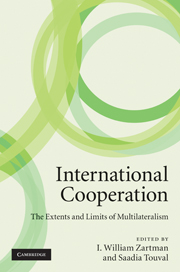Book contents
- Frontmatter
- Contents
- List of figures
- List of tables
- List of contributors
- Acknowledgements
- 1 Introduction: return to the theories of cooperation
- Part 1 Multilateral meanings of cooperation
- Part 2 Multiple strategies of cooperation
- 6 Synthesizing rationalist and constructivist perspectives on negotiated cooperation
- 7 The shadow of the past over conflict and cooperation
- 8 Chicken dilemmas: crossing the road to cooperation
- 9 Conflict management as cooperation
- 10 Status concerns and multilateral cooperation
- 11 Asymmetrical cooperation in economic assistance
- 12 Conclusion: improving knowledge of cooperation
- Bibliography
- Index
7 - The shadow of the past over conflict and cooperation
Published online by Cambridge University Press: 05 June 2012
- Frontmatter
- Contents
- List of figures
- List of tables
- List of contributors
- Acknowledgements
- 1 Introduction: return to the theories of cooperation
- Part 1 Multilateral meanings of cooperation
- Part 2 Multiple strategies of cooperation
- 6 Synthesizing rationalist and constructivist perspectives on negotiated cooperation
- 7 The shadow of the past over conflict and cooperation
- 8 Chicken dilemmas: crossing the road to cooperation
- 9 Conflict management as cooperation
- 10 Status concerns and multilateral cooperation
- 11 Asymmetrical cooperation in economic assistance
- 12 Conclusion: improving knowledge of cooperation
- Bibliography
- Index
Summary
Why do individuals and states choose cooperation over conflict? Common sense tells us that the context in which such a choice is made is critical, but defining the salient contours of context is a challenging task. Robert Axelrod's influential work on the evolution of cooperation, cited in over 4,000 articles, identifies a long shadow of the future (simply, when the players expect to continue interacting frequently) as a critical precondition for sustainable cooperation in a world of self-interested actors with no central authority. In the pages that follow, the terms “societal cooperation,” “systemic cooperation,” and “a cooperative regime” are used interchangeably to refer to such emergent multilateral cooperation. While affirming Axelrod's central insight, this chapter ultimately demonstrates the extreme fragility of the long shadow of the future. It is in reality a prisoner of the past – of historical context – to a greater extent than has been heretofore acknowledged.
The chapter introduces agent-based modeling, a variant of computer simulation, as a tool for advancing our understanding of the origins and development of cooperative regimes. By agent-based modeling, I mean “a computational methodology that allows the analyst to create, analyze, and experiment with, artificial worlds populated by agents that interact in non-trivial ways and that constitute their own environment” (Cederman 2001a, p. 16). As Robert Axelrod has argued, agent-based modeling facilitates a new way of conducting scientific research:
Simulation is a third way of doing science. Like deduction, it starts with a set of explicit assumptions. But unlike deduction, it does not prove theorems. […]
- Type
- Chapter
- Information
- International CooperationThe Extents and Limits of Multilateralism, pp. 111 - 134Publisher: Cambridge University PressPrint publication year: 2010
- 2
- Cited by



